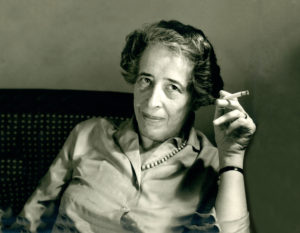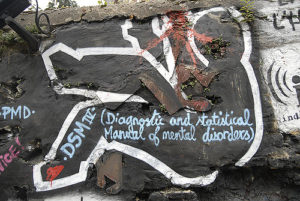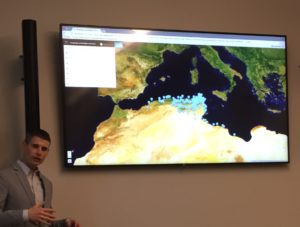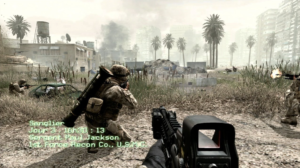DH Projects 2017-2020
Dr. Barbara Hahn
 The “Hannah Arendt. Collected Writings. Critical Edition. Digital and Print” will be a complete hybrid edition of Hannah Arendt’s published and unpublished work. Funded by Vanderbilt University and realized in collaboration with the Free University of Berlin, and the Göttingen State and University Library, the critical edition will edit, catalog and published all related unpublished and published texts, including extensive preliminary work stages, revisions and extensions, as collected writings in digital and print representation. The project leaders are Professor Barbara Hahn, Vanderbilt University, and Professor Hermann Kappelhoff of the Free University of Berlin.
The “Hannah Arendt. Collected Writings. Critical Edition. Digital and Print” will be a complete hybrid edition of Hannah Arendt’s published and unpublished work. Funded by Vanderbilt University and realized in collaboration with the Free University of Berlin, and the Göttingen State and University Library, the critical edition will edit, catalog and published all related unpublished and published texts, including extensive preliminary work stages, revisions and extensions, as collected writings in digital and print representation. The project leaders are Professor Barbara Hahn, Vanderbilt University, and Professor Hermann Kappelhoff of the Free University of Berlin.
Dr. Jenifer Dodd, History
Mellon Postdoctoral Fellow in Digital Humanities

The American Psychiatric Association presents the DSM, its official manual of mental illnesses, as an objective and authorless document whose only changes reflect increasingly scientific knowledge. Yet the Diagnostic and Statistical Manual of Mental Illnesses has been heavily contested since it was first published in 1952, and represents an accumulation of competing frameworks and interests of hundreds of different psychiatrists. This project seeks to visualize the contested nature of the DSM by highlighting how the manual has changed over time for both popular and scholarly audiences. Using both the published manuals and archival documents, I focus on sexuality in particular, and on three aspects of the DSM: the people involved, the diagnoses listed, and how those diagnoses are structured.
Mark Wollaeger, English
Mellon Faculty Fellow in Digital Humanities
 This project focuses on collaborative work between corporate engineers and artists that began in the mid 1960s under the aegis of Experiments in Art and Technology (E.A.T), an enterprise that brought together engineers from Bell Labs, led by Billy Klüver, and a diverse range of New York artists, including Robert Rauschenberg, John Cage, and Merce Cunningham. The most well known fruit of this collaboration was “9 Evenings,” an interdisciplinary project blending avant-garde theater, dance and new technologies over the course of nine evenings that is now recognized as a watershed moment in art and media history. The project will draw on diverse archives to produce a digital exhibit of this collaboration.
This project focuses on collaborative work between corporate engineers and artists that began in the mid 1960s under the aegis of Experiments in Art and Technology (E.A.T), an enterprise that brought together engineers from Bell Labs, led by Billy Klüver, and a diverse range of New York artists, including Robert Rauschenberg, John Cage, and Merce Cunningham. The most well known fruit of this collaboration was “9 Evenings,” an interdisciplinary project blending avant-garde theater, dance and new technologies over the course of nine evenings that is now recognized as a watershed moment in art and media history. The project will draw on diverse archives to produce a digital exhibit of this collaboration.
Dr. Bradley Daugherty, Religion, Historical Studies
Mellon Postdoctoral Fellow in Digital Humanities

The long-lasting division of Christianity into two competing communions in the fourth century is one of the major instances of religious schism in Late Antiquity, and the reasons for the division remain a matter of scholarly debate. The most influential mid-twentieth-century English-language work on the subject explained the schism through a combination of physical and cultural geography, a theory that is no longer considered adequate to the question. This project revisits this long-standing historiographical question, investigating geography as a factor in the division of Christianity in Roman North Africa utilizing a research method that has not previously been applied to the question: spatial analysis via Geographic Information Systems (GIS).
Seth Kim, Cinema and Media Arts
Mellon Faculty Fellow in Digital Humanities
 This project scrutinizes the militarization of US culture in the years following the September 1, 2001 attacks. Theorizing a broader process of militarization that includes US police forces, the project examines how mass culture in the twenty-first century familiarizes the civilian population with military technique. Focusing on first-person and third-person video games, such as the Call of Duty (2003-ongoing) and Grand Theft Auto (1997-ongoing), the project brings together an archive of player data that challenges dominant notions regarding video games and gendered aggression. It also analyses the more urgent relationship between the medium of video games, its users, and the mediation of state violence in post-9/11 America.
This project scrutinizes the militarization of US culture in the years following the September 1, 2001 attacks. Theorizing a broader process of militarization that includes US police forces, the project examines how mass culture in the twenty-first century familiarizes the civilian population with military technique. Focusing on first-person and third-person video games, such as the Call of Duty (2003-ongoing) and Grand Theft Auto (1997-ongoing), the project brings together an archive of player data that challenges dominant notions regarding video games and gendered aggression. It also analyses the more urgent relationship between the medium of video games, its users, and the mediation of state violence in post-9/11 America.
Tracy Miller, History of Art and Asian Studies
Mellon Faculty Fellow in Digital Humanities
 This project involves developing a database of traditional Chinese architecture, with a special focus on timber-frame ritual architecture of China’s early middle period (ca. 900-1200 CE). The final Digital Research Tool will consist of four interrelated components: a searchable text-based Linked Open Data (LOD) database of sites, architectural complexes, individual structures, and structural elements; a photo archive of images keyed to the search terms of the database; a mapping tool to allow data and photo search results to be geolocated on a map of modern China; and map outputs for use in other projects. The project has received funding by the Mellon Foundation, the NEH, the Graham Foundation, and Vanderbilt University.
This project involves developing a database of traditional Chinese architecture, with a special focus on timber-frame ritual architecture of China’s early middle period (ca. 900-1200 CE). The final Digital Research Tool will consist of four interrelated components: a searchable text-based Linked Open Data (LOD) database of sites, architectural complexes, individual structures, and structural elements; a photo archive of images keyed to the search terms of the database; a mapping tool to allow data and photo search results to be geolocated on a map of modern China; and map outputs for use in other projects. The project has received funding by the Mellon Foundation, the NEH, the Graham Foundation, and Vanderbilt University.
Kimberly Welch, History
Mellon Faculty Fellow in Digital Humanities
 This project traces human trafficking and kidnapping rings in the antebellum United States. It draws on kidnapped black people’s lawsuits for freedom in Natchez, Mississippi—free people abducted in northern states and sold as slaves in the Deep South. The project will use these lawsuits toward two ends: first, to map the trafficking networks the abductors used to move free people of color through the domestic slave trade and into enslavement in the Deep South; and second, to map the networks—both local and distant—that the abducted drew upon in their lawsuits. By geocoding data from trial records the project will enable a spatial analysis of the neighborhoods through which free people of color moved, and will make visible the interpersonal, regional, legal, and commercial networks they leveraged.
This project traces human trafficking and kidnapping rings in the antebellum United States. It draws on kidnapped black people’s lawsuits for freedom in Natchez, Mississippi—free people abducted in northern states and sold as slaves in the Deep South. The project will use these lawsuits toward two ends: first, to map the trafficking networks the abductors used to move free people of color through the domestic slave trade and into enslavement in the Deep South; and second, to map the networks—both local and distant—that the abducted drew upon in their lawsuits. By geocoding data from trial records the project will enable a spatial analysis of the neighborhoods through which free people of color moved, and will make visible the interpersonal, regional, legal, and commercial networks they leveraged.